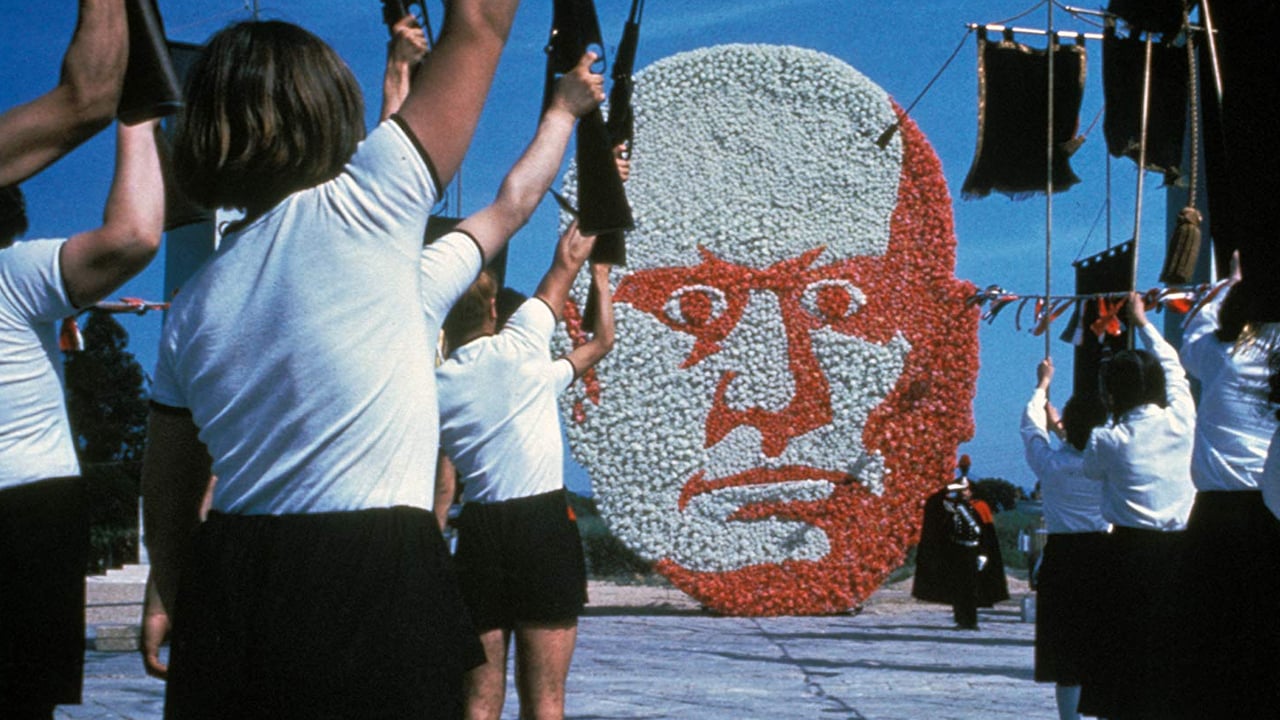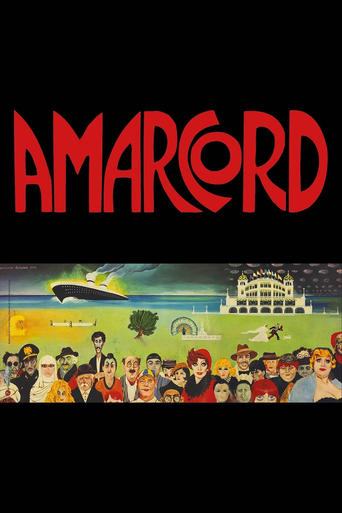

Brilliant and touching
... View MoreAfter playing with our expectations, this turns out to be a very different sort of film.
... View MoreI enjoyed watching this film and would recommend other to give it a try , (as I am) but this movie, although enjoyable to watch due to the better than average acting fails to add anything new to its storyline that is all too familiar to these types of movies.
... View MoreIt is encouraging that the film ends so strongly.Otherwise, it wouldn't have been a particularly memorable film
... View MoreI tried to like it, I really did. Sure, there were some entertaining vignettes, interesting characters, a delightful soundtrack, and some heartfelt scenes, both physically and emotionally. But nothing really moved me. And I was bored. I understand this film was quite personal for Fellini. I guess that means I am unable to understand his Italian way of life quite enough to appreciate this one. I like Fellini overall, but this was definitely not one of his best. "Life is a combination of magic and pasta," he said. This was not magic. Not my kind, anyways.
... View MoreNobody like Fellini. Connected to all levels of reality and dreams. Seemingly effortless filmmaking from the Maestro and his great team of actors & cinema artists. His vision never ages, only increases in meaning and true empathy for his fellow man. Sophocles nailed it - "Numberless are the world's wonders, but none More wonderful than man; the storm gray sea Yields to his prows, the huge crests bear him high; Earth, holy and inexhaustible, is graven With shining furrows where his plows have gone Year after year, the timeless labor of stallions... O clear intelligence, force beyond all measure! O fate of man, working both good and evil! When the laws are kept, how proudly his city stands! When the laws are broken, what of his city then? Never may the anarchic man find rest at my hearth, Never be it said that my thoughts are his thoughts." "
... View MoreI remember having seen Amacord in the late 1970s; and also that its last scene left a sad feeling in me, despite having had good fun watching the rest and more than a few laughs in some of the most outrageous scenes: the antics of teachers and students in the classroom, the hilarious shenanigans at the family table, the day out in the countryside, etc. If I had at the time to resume the whole movie in one word I would have said: Nostalgia. What perhaps gives a good hint of how the world has changed, or maybe me, is that after this present day viewing I would have said two different words: Sadness, Melancholy. Amacord is such a melancholic film, it made me feel sorry for Fellini, for the things he had to endure during those early years of his life. I didn't notice at the time how sad is to have to grow up in a political system that doesn't allow the smallest form of dissent and which, even worse, has managed to entirely wrap up the lives of everyone in society and made of them contented, brainless, drones. How sad to have had, in that crucially formative period of our life nothing but unfunny clowns as our role models: the patriarch who nobody takes seriously and who in utter frustration tries to commit suicide tearing apart his own jaws; a poor sap whose isolated act of rebellion backfires and ends up in a literal stinko. The priest more preoccupied with church flower arrangements than with the confession of his young faithful. The parasitic uncle who pays his brother in law for providing him with free room and board by denouncing him to the fascist police. The gramps who rather than to dispense wise, time tested, advice to his grandchildren prefer to spend his time grabbing the maid, farting and reminiscing about "the old in and out", as Alex Lelarge would put it. A gallery of characters that, if you look behind the antics, the laugh, are throughly pathetic. Growing amongst them must have been quite an ordeal for poor young Federico.Of course some will have a different view on things, taking what Fellini himself postulated about the artist and reality "What is reality, who cares about reality?" He snaps back, answering to his interviewer, when confronted with the idea that any artwork is the fruit of the artist's take on reality. Not so, he says. The artist's work is not the reflection of reality in his mind, soul, but an entirely new construct by him. The artist creates his own reality says Fellini, and because of that he, Fellini, defines himself as a lier, but a honest one. So, we are not here to see his reminiscences of his younger years but to see the construct of his own imagination, using as basic bricks for it his own experiences, or those of others. Some of what we see in Amacord really happened, in the same way or not, and some of it is just his imagination. But we are not here to decode fiction from reality--must be our conclusion—but to watch what he has prepared for us. Sorry but that doesn't change the bare historical facts. Titta, Fellini's best friend, speaks of his complete indifference to the then prevailing political system and, given the faithful reproduction of the social conditions at the time in the film, we can only assume that what lay behind such indifference was nothing but a complete impotence and powerlessness face to the reigning situation as Titta's father, in the movie, shows us well where any demonstration of protest or revolt could have led the protester.One point well made by the DVD commentators concerns the subservient role played by women in Fellini's movies. Real communication, intimacy, between the sexes is practically absent, at least in this one, and women usually appear there to fulfill men's fantasies—to offer them their over-sized backsides and breasts for appreciation, for ex.--to clean after them or to take whatever blame is for the taking. Examples on this abound and I mention it because it's something I noticed also. The film begins, in fact, with the public burning of the "winter witch"(!)--with no Spring Fairy in sight. Then a good deal of movie time is spent showing males of all ages salivating at the sight of female body parts--which makes for a rather eerie analogy with a butcher's view of things--and ends up with the saddest vignette of all: Gradisca, the only truly liberated woman in town, marrying...a Mussolini carabiniere. A bird free as the wind willingly getting into a steel cage, everything coming into order... But anyway, this is a masterly made piece of cinematography. The color compositions are truly breathtaking, specially during the surreal late afternoon scene where the mad uncle is ordered down the tree by a midget nun. Also kudos for the night passage of the Rex and the foggy morning. Other scenes that deserve applause are the school kids dancing to the film's score outside the Grand Hotel, the bum playing the flute to the harem, the Mussolini parade and the recurrent guy in the motorcycle—I wish Gradisca had married him instead. The pacing is sustained and the camera work appropriate, without being what draws the most attention--that's ostensibly the colors. The acting, well, these people don't even seem to be acting, they are just being themselves, as in any typical Fellini. As for plot, there's no one here, just a composition of miscellaneous anecdotes intended to create a mood in the viewer, presumably of nostalgia...or sadness maybe. In all, a great Fellini, if not the most joyful or the deepest. 7.5/10.
... View MoreHaving watched and loved La Dolce Vita, 8 1/2 and La Strada previous to Amarcord, I was understandably expecting good things for this film. And I got that exactly. This is said to be Fellini's most personal film, and this comes through loud and clear, as his direction is superb. So is the movie.When Amarcord is funny it is quite hilarious, and when it is poignant it is heart breaking. I can understand why someone mayn't like it, some aspects are rather coarse- not a bad thing for me- but if you see it again you may find it grows on you.The visuals as I thought it would be are beautiful. I loved the skillful cinematography, and the sets, locations and costumes are lavish and colourful. There are also some very memorable scenes, the peacock in the middle of the snow is one of the most breathtakingly beautiful images I have seen recently.I also love the score. I have always considered Nina Rota a wonderful composer; The Godfather, La Dolce Vita and 8 1/2 all to name a few have a knack of being not only beautiful and haunting but also that they stick in the mind long afterwards. Amarcord's score is no exception, if anything it adds to the film's quirks and poignancy.The script is also fine. What I loved most about it was its deft mix of humour and sentiment and also childhood memory and adult insight. The story is never less than compelling, even with the expansive running time. It has interesting themes(ie. mocking Mussolini's regime, Roman Catholicism and the prejudices and peculiarities of the bourgeoisie) and for me it had few dull moments.The characters I think grow on you. They may seem like stereotypes at first perhaps, but once you see the film more, they are as human as they are grotesque. The acting is excellent, Magali Noel is the standout lightening up the screen with her allure and acting talent.Overall, Amarcord is a wonderful film, while it wasn't my first Fellini movie, I'd say this is a good enough introduction to the work of a master director. 10/10 Bethany Cox
... View More